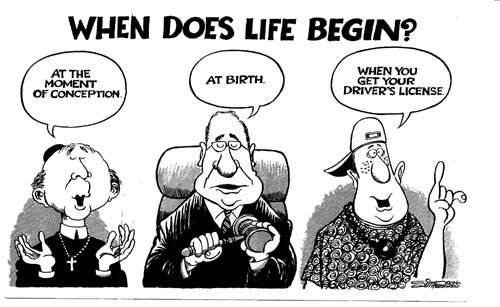The people of Mississippi are set to vote on an initiative to amend the state Constitution to define personhood as starting at the moment of fertilization. If fertilized eggs are people, then abortion is murder. The ballot, which has received widespread bipartisan support and is likely to pass, is rather short and rigid:
Section 33. Person defined. As used in this Article III of the state constitution, “The term ‘person’ or ‘persons’ shall include every human being from the moment of fertilization, cloning or the functional equivalent thereof.
It's no surprise Mississippians are against abortion; what's interesting is that people still turn to religion to answer seemingly scientific questions like when a human should be considered a person. NPR's Michael Martin covers the topic by interviewing religious leaders:
Now, when voters are asked to consider a weighty moral issue such as this, some turn to their faith for answers, so in a minute we've decided to turn to two religious leaders who are on opposite sides of this question.
Why turn to religious leaders on this issue? What do religious leaders know about life? What evidence do they have (regardless of what their religion is) for when life begins or ends? Or what happens after life ends? None. Zero. In fact, there is as much reason to think that Santa Claus is real as there is for thinking that personhood begins at conception.

Anyway, NPR's idea of fair coverage of the issue is to talk to two pro-life pastors, one pro the ballot and the other against. The former, pastor Dillon, supports the ballot because he was brought up to think that life is precious and sacred, and that god wouldn't approve of murder. Well, yes - life is precious, and murder is in most cases wrong. But why is it that the states that oppose abortion are also the ones with the highest rates of capital punishment? And violent crime (see Richard Dawkins's The God Delusion for evidence for these claims)? And if life is so precious, shouldn't we all be vegetarians? Or not eat at all, if we consider the that plants are living organisms too?
On the other hand, pastor McDonald opposes the ballot because its vague wording wouldn't allow exceptions to the rule in cases of rape or incest, and because he is opposed to big government:
And so this far-reaching arm of the government - I mean we're fighting to get government out of our lives, why would we vote to have government to come more into our personal lives and into our families and into our faith even? These matters should be left to people of faith, to be left to parents or the women and men who are specifically, directly involved in it, and not up to government.
This is actually quite an honest admission that most conservatives won't allow - it's very hard to reconcile small government with rigid anti-abortion laws. Why, if some people don't want government telling them what to do, do they want it to tell others what to do? In this sense, I commend pastor McDonald's consistent perspective. The right to choose is both a freedom consistent with conservative beliefs and a governmental protection consistent with liberalism. So why can't people agree?
But the real question is about when life begins. Is a clump of cells to be considered a human being? How about an adult in a vegetative state? Neuroscience has the capability to answer these questions definitively, and the answer that's creeping up is that personhood or mental capacity (and the capacity for joy, suffering, pain, etc) is tightly correlated with functional complexity of the nervous system. That's why some scientists propose that dolphins and other cetaceans be considered "nonhuman persons." The case for fertilized eggs to be considered persons is unambiguous; they are not people, period. Things get more complicated at later stages of development, and at some point abortion may in fact be murder. The difficulty is that unlike pornography, which we can't define but know it when we see it, personhood can be defined (by nervous system function), it's just that we're not sure if we know it when we see it.
Practically, the problem is when people choose to believe something in spite of evidence to the contrary (this is called 'faith'). The pastors in the NPR interview think of embryos as people, and think it's wrong to "kill" these "people" because presumably they feel emotional and physical pain as adult humans do. This is simply delusion, to borrow Richard Dawkins' nomenclature. The sad part is that no amount of evidence will persuade these people of the truth (unless of course archeologists dig up long-lost "Neuroscientific Gospels," in which god commands his followers to demand evidence for everything).
This would be funny if it weren't so sad and dangerous: the Mississippian people are almost certainly doomed to pass the Personhood Amendment, and they are not peerless among the states. Perhaps the best we as scientists can do is to instill in children a desire to think critically and accept nothing without evidence.